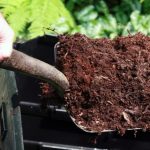Coffee grounds are good for tomato plants because they enrich the soil with essential nutrients and help in warding off pests. When used as a fertilizer, coffee grounds provide a source of nitrogen, phosphorus, and potassium, which are vital for tomato growth.
Additionally, coffee grounds act as a natural deterrent to slugs and snails, reducing the risk of plant damage. It is important to mix the coffee grounds with compost or soil to prevent acidity levels from becoming too high.
Improving Soil Quality
Coffee grounds can be beneficial for improving soil quality for tomato plants. The high nitrogen content in coffee grounds aids in healthy growth and increased fruit production. When used in moderation, coffee grounds can be a natural and eco-friendly way to enhance your tomato garden.
Coffee Grounds Enrich The Soil With Organic Matter
One of the significant benefits of using coffee grounds in your tomato garden is that it enriches the soil with organic matter. Organic matter is essential for creating fertile soil that promotes healthy plant growth. And coffee grounds are a fantastic source of organic matter due to their high carbon content.
When you add coffee grounds to the soil, they break down slowly, releasing nutrients and providing a long-lasting source of organic matter. This improves soil fertility and helps create the ideal environment for tomato plants to thrive.
Improve Soil Structure And Water Retention
In addition to enriching the soil with organic matter, coffee grounds also play a crucial role in improving soil structure and water retention. The texture of coffee grounds helps to loosen compacted soils, allowing better circulation of air and water. This is especially beneficial for tomatoes, which prefer well-draining soil.
By incorporating coffee grounds into the soil, you can enhance its structure, prevent waterlogging, and enable the roots of your tomato plants to access oxygen efficiently. Proper soil structure and water retention are vital for promoting healthy root development and reducing the risk of water-related diseases, such as root rot.
Aid In The Release Of Essential Nutrients For Plant Growth
Another remarkable advantage of using coffee grounds for tomato plants is their ability to aid in the release of essential nutrients. Coffee grounds are a rich source of several key nutrients that tomatoes need to grow and fruit abundantly, including nitrogen, phosphorus, potassium, and calcium.
When coffee grounds are added to the soil, they undergo a natural decomposition process, releasing these nutrients gradually, as the plants require them. This ensures that your tomato plants receive a consistent supply of the vital nutrients necessary for healthy growth and abundant yields.
In addition to providing nutrients directly, coffee grounds also benefit the soil by creating a favorable environment for beneficial microorganisms. These microorganisms help break down organic matter, making nutrients more available to plants and contributing to overall soil health.
So, in conclusion, incorporating coffee grounds into your tomato garden is a fantastic way to improve soil quality, as it enriches the soil with organic matter, improves its structure and water retention, and aids in the release of essential nutrients for optimal plant growth. By utilizing this readily available and beneficial resource, you can create an ideal environment for your tomato plants to thrive and enjoy a bountiful harvest.
Natural Pest Control
Coffee grounds act as a natural deterrent against pests
Coffee grounds are not only beneficial for providing essential nutrients to tomato plants but also serve as a natural deterrent against pests. These discarded coffee grounds have properties that help repel insects and keep harmful pests at bay. Instead of resorting to chemical-laden bug repellents, coffee grounds offer an eco-friendly and effective solution to protect your tomato plants from unwanted damage.
Repel insects and pests harmful to tomato plants
Insects and pests can wreak havoc on tomato plants, jeopardizing your harvest. However, coffee grounds act as a formidable barrier, repelling these unwanted visitors. The strong aroma of coffee grounds drives away pests such as slugs, snails, and aphids, which are particularly harmful to tomato plants. By scattering coffee grounds around your tomato plants, you create a natural barrier that helps keep these pests at bay, reducing the risk of damage to your precious plants.
Encourage the presence of beneficial organisms in the soil
In addition to repelling harmful pests, coffee grounds also play a crucial role in promoting a healthy ecosystem in your garden soil. Coffee grounds are rich in organic matter, which serves as a food source for beneficial organisms in the soil, including earthworms. Earthworms help break down organic matter, improving soil structure and nutrient availability for your tomato plants. By incorporating coffee grounds into the soil around your tomato plants, you create a favorable habitat for these beneficial organisms, ensuring a thriving and balanced environment for your plants.
Increase Nutrient Availability
The use of coffee grounds in your tomato garden can significantly increase the nutrient availability for your plants. Coffee grounds are not only a fantastic source of nitrogen but also provide essential nutrients like potassium and phosphorus. Moreover, these grounds can enhance overall plant health and vigor, ensuring your tomato plants thrive and yield bountiful harvests. Let’s dive deeper into the benefits of coffee grounds in tomato gardening.
Coffee Grounds Are A Good Source Of Nitrogen
Coffee grounds are rich in nitrogen, a vital macronutrient that plays a crucial role in plant growth and development. Nitrogen is responsible for promoting the production of chlorophyll, which aids in photosynthesis and gives plants their green color. When you add coffee grounds to your tomato plants, they gradually release nitrogen into the soil, providing a sustainable source of this essential nutrient.
Provide Essential Nutrients Like Potassium And Phosphorus
In addition to nitrogen, coffee grounds also provide essential nutrients like potassium and phosphorus that are necessary for robust tomato plant growth. Potassium aids in overall plant development, helping to strengthen stems and improve fruit quality. Phosphorus, on the other hand, supports root development and promotes the production of flowers and fruits. By incorporating coffee grounds into your tomato garden, you’re ensuring a steady supply of these vital nutrients for your plants.
Enhance Overall Plant Health And Vigor
Using coffee grounds in your tomato garden goes beyond providing essential nutrients; it also enhances overall plant health and vigor. The organic matter present in coffee grounds helps improve soil structure, retaining moisture and providing aeration to the roots, which is crucial for optimal growth. Additionally, the decomposition of coffee grounds adds organic matter to the soil, promoting the growth of beneficial microorganisms that aid in nutrient absorption and disease resistance. By optimizing the health and vigor of your tomato plants, you’re creating an environment that maximizes their potential for a thriving harvest.
:max_bytes(150000):strip_icc()/is-coffee-good-for-plants-getty-0723-951f958e9e194a1195c2a1fcc2fc2460.jpg)
Credit: www.marthastewart.com
Preventing Diseases
When it comes to growing healthy and thriving tomato plants, preventing diseases should be a top priority for every gardener. One powerful and natural way to keep those dreaded tomato plant diseases at bay is by using coffee grounds. Coffee grounds have long been praised for their ability to benefit plants, and their antifungal properties make them particularly effective in suppressing fungal diseases in tomato plants. By incorporating coffee grounds into your tomato plant care routine, you can reduce the risk of soil-borne pathogens and ensure a healthier growing environment for your precious plants.
Coffee Grounds Have Antifungal Properties
Coffee grounds contain compounds that have been found to possess antifungal properties. These compounds, such as caffeine and diterpenes, can help inhibit the growth and spread of fungal pathogens that commonly affect tomato plants. By introducing coffee grounds into the soil around your tomato plants, you are providing a natural defense mechanism that helps combat fungal diseases.
Help Suppress Fungal Diseases In Tomato Plants
One of the primary benefits of using coffee grounds in your tomato garden is their ability to help suppress fungal diseases. Fungi such as Fusarium and Verticillium can wreak havoc on tomato plants, causing wilting, stunting, and even death. However, studies have shown that the application of coffee grounds to the soil can significantly reduce the incidence and severity of these fungal infections. Additionally, coffee grounds can create an unfavorable environment for fungal spores to thrive, further protecting your tomato plants from potential harm.
Reduce The Risk Of Soil-borne Pathogens
Soil-borne pathogens pose a constant threat to the health of tomato plants. These microscopic organisms can reside in the soil, waiting for an opportunity to attack vulnerable roots and compromise the overall vitality of the plant. By incorporating coffee grounds into the soil, you can help create an environment that is less hospitable to these pathogens. Coffee grounds act as a natural barrier, discouraging the growth and spread of harmful microorganisms, thus ensuring the long-term health of your tomato plants.
How To Use Coffee Grounds For Tomato Plants
How to Use Coffee Grounds for Tomato Plants
Growing your own tomatoes can be a rewarding experience, but it’s not always easy to keep your plants healthy and thriving. Did you know that coffee grounds can actually be beneficial for your tomato plants? Coffee grounds are packed with nutrients that tomatoes love, making them an excellent natural fertilizer. In this article, we’ll discuss three different ways you can use coffee grounds for your tomato plants to ensure they get the nutrients they need to grow strong and produce delicious fruits.
Composting Coffee Grounds To Ensure Proper Decomposition
Before using coffee grounds as fertilizer, it’s important to compost them to ensure proper decomposition. Composting allows the coffee grounds to break down further, releasing their nutrients in a form that is more easily absorbed by tomato plants. Here’s how you can compost coffee grounds:
- Collect used coffee grounds and add them to a compost bin or pile.
- Mix the coffee grounds with other compostable materials, such as vegetable scraps and leaves.
- Turn or mix the compost regularly to aerate it and speed up the decomposition process.
- Once the coffee grounds have fully decomposed into rich, dark compost, you can use this compost to feed your tomato plants.
Applying Coffee Grounds As A Mulch Around Tomato Plants
Another way to use coffee grounds for tomato plants is by applying them as a mulch around the base of the plants. This not only helps retain moisture in the soil but also acts as a natural weed suppressant. Here’s how you can apply coffee grounds as mulch:
- Collect used coffee grounds and let them dry out.
- Sprinkle a thick layer of dried coffee grounds around the base of your tomato plants, being careful not to touch the stems directly.
- Water the coffee grounds thoroughly to ensure they penetrate into the soil.
- Reapply the coffee grounds as mulch every few weeks to maintain their benefits.
Mixing Coffee Grounds With Potting Mix For Container Gardening
If you’re growing tomatoes in containers, you can still benefit from using coffee grounds by mixing them with your potting mix. This adds nutrients to the soil and helps retain moisture. Here’s how you can mix coffee grounds with potting mix:
- Collect used coffee grounds and let them cool down and dry.
- In a container, mix equal parts coffee grounds and potting mix.
- Fill your pots or containers with the coffee ground-infused potting mix.
- Plant your tomato seedlings or transplants as usual, ensuring they are well-watered.
These three methods give you different ways to incorporate coffee grounds into your tomato growing routine. Whether you choose to compost them, use them as mulch, or mix them into your potting mix, coffee grounds can provide the extra nutrients your tomatoes need to thrive. So don’t throw away those used coffee grounds – put them to good use and watch as your tomato plants flourish!
Dos And Don’ts When Using Coffee Grounds
Using coffee grounds in your tomato garden can be an excellent way to provide your plants with valuable nutrients and support their growth. However, to ensure the best results, it’s important to follow some dos and don’ts when incorporating coffee grounds into your gardening routine. By using coffee grounds in moderation, avoiding using them as the sole fertilizer, and balancing their nitrogen content with other materials, you can optimize their benefits without risking over-fertilization. Let’s explore these guidelines in detail:
Use Coffee Grounds In Moderation To Prevent Over-fertilization
While coffee grounds can be a fantastic source of nitrogen, it’s crucial not to go overboard. Too much nitrogen can lead to excessive leafy growth at the expense of fruit production. To prevent over-fertilization, use coffee grounds sparingly and in moderation.
Remember, moderation is key. It’s best to start with a small amount of coffee grounds and gradually increase the quantity if needed. Monitor your plants’ growth and health closely, making adjustments as necessary.
Avoid Using Only Coffee Grounds As A Fertilizer
While coffee grounds are beneficial, they should not be the sole fertilizer for your tomato plants. Using only coffee grounds can disrupt the nutrient balance in the soil, leading to deficiencies in other essential nutrients.
Instead, think of coffee grounds as a supplement rather than a complete fertilizer. Combine them with other organic materials, such as compost or aged manure, to create a nutrient-rich soil mix that supports the overall health of your tomato plants.
Balance Nitrogen-rich Coffee Grounds With Other Materials
Coffee grounds are known for their high nitrogen content, which is an essential nutrient for plant growth. However, an excess of nitrogen can hinder the development of fruits and flowers in tomato plants. To maintain a balanced nutrient profile, it’s crucial to combine coffee grounds with other materials.
Consider adding carbon-rich materials like shredded leaves, straw, or wood chips to the soil alongside coffee grounds. This helps balance out the high nitrogen content, facilitating optimum nutrient absorption by the plants.
A balanced soil mixture leads to healthy root development, strong stems, and healthy fruit production. By maintaining a nutrient-rich environment, you’re providing the ideal conditions for your tomato plants to thrive.
In summary, incorporating coffee grounds into your tomato garden can offer several benefits, but it’s essential to follow the dos and don’ts mentioned above. Using coffee grounds in moderation, avoiding relying solely on them as a fertilizer, and balancing their nitrogen content with other materials will help maximize their effectiveness without causing over-fertilization. By following these guidelines, you can enjoy healthy and productive tomato plants in your garden!
Frequently Asked Questions Of Are Coffee Grounds Good For Tomato Plants
Are Coffee Grounds Good For Tomato Plants?
Coffee grounds can be beneficial for tomato plants as they provide nutrients like nitrogen, potassium, and phosphorous. They also help in improving soil structure, increasing water retention, attracting beneficial earthworms, and repelling pests. However, it’s important to use coffee grounds in moderation to avoid acidity buildup in the soil.
Conclusion
Coffee grounds can be a great addition to your tomato plants. They provide essential nutrients like nitrogen, potassium, and calcium, promoting healthy growth and improving soil quality. In addition, the acidic nature of coffee grounds can deter pests and prevent fungal infections.
However, it’s crucial to use coffee grounds in moderation and avoid using them exclusively as a fertilizer. So, go ahead and give your tomato plants a boost with coffee grounds, but remember to maintain a balanced approach for the best results!

I am a graduate of Bangladesh Agricultural University, where I delved into various agricultural disciplines, equipping me with a profound understanding of agriculture. Beyond academics, I have hands-on experience in gardening and crop cultivation. My passion is to embrace sustainable farming and horticulture. With a BSc in Agriculture, I am dedicated to promoting environmentally conscious and efficient agrarian practices.
Bachelor of Science (BSc) in Agriculture (Hons.)
Master of Science. (Sustainable Agriculture & Food Security ) (MS)
Bangladesh Agricultural University



